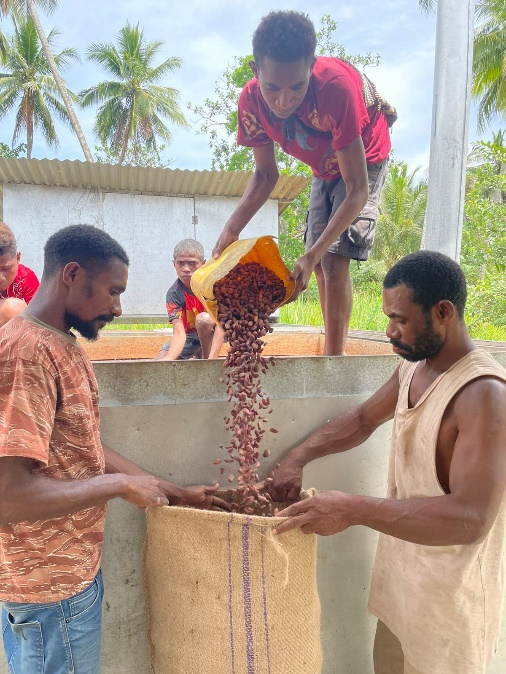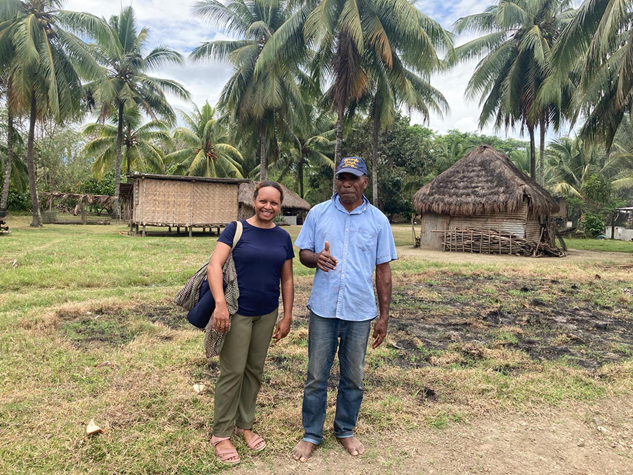Agriculture is considered by most to be ‘the backbone’ of Papua New Guinea (PNG). It is the main source of food, employment and income for 85% of the population who live in PNG’s rural areas. Surveys consistently show that, besides improved access to health services, education and better road connectivity, agriculture is the sector that most Papua New Guineans consider the most important for government investment.
And it has weathered the COVID-19 pandemic remarkably well. March’s World Bank PNG Economic Update highlighted that PNG’s agriculture sector had weathered the pandemic better than most sectors; with cocoa exports significantly increasing during 2020 and 2021.
Earlier this year, as the country began to get back on its feet after a tough 2021, I travelled to the Markham Valley, famous for its fertile lands and being the main ‘food basket’ for PNG’s Momase region. The Valley, according to PNG’s Cocoa Board, is currently the top producer of export-quality cocoa in Morobe Province; a part of PNG considered by many as the most agriculturally rich in the entire country.

In Papua New Guinea’s Markham Valley, behaviors have shifted from cocoa being an ‘occasional’ project for locals, to becoming the heart of many sustainable family businesses. Farmer Isaac Sam (pictured, right; who’s story is showcased in this story) from the remote Onga-Waffa district seen here with his children packing dry cocoa beans says he is a happy farmer because his able to pay for his kids’ education and medical when they need it because of cocoa.
My first stop was the small township of Mudzing, about 160 kilometers from PNG’s industrial city, Lae, to visit small scale cocoa farmers who have received support through the PNG Government’s flagship Productive Partnership in Agriculture Project; which has been funded by the World Bank and the International Fund for Agricultural Development (IFAD). Driving into Mudzing, it’s hard to miss the economic activities with trucks passing by loaded with cocoa bags heading to markets, farmers in drying rooms and well-maintained cocoa blocks, tending to their beans.
“There are now three cocoa buying companies with depots based in Mudzing providing competitive rates for our farmers,” said Abraham Joseph, one of the leading farmers in Mudzing; pointing them out to me. “The easy access to markets for our farmers – especially women – means we save on transport cost and traveling long distances with heavy cocoa bags.”
In 2016, Abraham received training and 200 cocoa seedlings through the Project, which he planted on two hectares of his family’s land. He has since increased his crop to 4,000 cocoa trees over six hectares.

Cocoa farmer Abraham Joseph (right) taking the World Bank’s Ruth Moiam for a tour of his cocoa farm. Abraham is one of over 500 cocoa farmers in the Markham valley of Papua New Guinea’s Morobe Province supported by the World Bank and PNG Government’s Productive Partnership in Agriculture Project.
Driving into his cocoa farm, it’s hard not to be impressed by what Abraham has achieved. His home, standing proudly alongside another two that belong to his children, is what many working-class Papua New Guineans dream of for years to build. He sees the impressed look on my face and reflects on his family’s journey.
“Farming cocoa is hard work but because we do it as a family unit, the financial reward is great and continues to benefit us,” says Abraham, who explains that in the Markham Valley, behaviors have shifted from cocoa being an ‘occasional’ project for locals, to becoming the heart of many sustainable family businesses.
Abraham’s success is mirrored by Inchn Zisu, a female farmer from nearby Magian village; about 30 minutes’ drive inland from Mudzing. Magian is accessible by the Wampua feeder road – a road that was also rehabilitated with support from the project – meaning farmers can get themselves – and their fresh cocoa – to markets.
“Before this road was built, we use to carry our cocoa bags across a fast-flowing river to reach the main road - and then travel two or three hours down to [Morobe Province’s capital] Lae to sell our produce,” Inchn told me. “Today buyers travel into the village to buy directly from our doorstep, and the reduced travel cost and time has really benefited many of us; particularly the women farmers .”
Inchn Zisu (pictured), from the village of Magian, in Papua New Guinea’s Markham Valley, has been farming cocoa for more than three years. She has over 1,200 cocoa trees, and says the support from the World Bank-supported Productive Partnerships in Agriculture Project has delivered many positive changes. Today she owns a cocoa fermentary, a small trade store that serves her village and has even built a house for her family.
Inchn has since built a fermentary to help with processing dry cocoa beans, as well as a small trade store that serves other farmers and people from her village. She has also built a home for her children. As a single parent, she adds the thing that makes her the proudest as a cocoa farmer is being able to afford sending her kids to school to gain an education.
“My children are currently attending tertiary institutions and will have formal jobs very soon,” said Inchn. “I’ve been able to support their education because of farming cocoa. I’m very proud.”
Since the World Bank-funded project started in 2010, it has substantially increased the income and yields of more than 60,000 cocoa and coffee growers across PNG, including improving the livelihood of an estimated 50,000 women across 12 provinces. And the project has also helped build or rehabilitate 121 kilometers of roads in nine provinces; improving access to markets – and to other essential services; like clinics and schools – for farmers and their families.
The US$110 million (PGK303 million) project formally wrapped-up in May 2021, yet the benefits for small-scale farmers and their families in communities like the Markham Valley are lasting. Building on this success, the World Bank is now supporting the Government of PNG ’s follow up project – the five-year, US$40 million (PGK142 million) PNG Agriculture Commercialization and Diversification Project. The new project will build on the cooperative approach already established by PPAP, but also focus on the diversification of income and livelihood from other crops such as coconut, spices and small livestock, with the additional aim of helping to improve the nutrition of Papua New Guineans – with greater production of healthy, locally-grown foods.
This is an exciting time for PNG’s agriculture sector, and one that fills me with enormous hope. After two years of uncertainty due to the COVID-19 pandemic and restrictions around travel, my two-day visit to these farmers was rewarding; a powerful reminder of the opportunity and hope for agriculture in our extraordinarily fertile, green country. Most Papua New Guineans, myself included, come from families who proudly work the land to support their families and communities – and during my visit to the Markham Valley I felt the determination and optimism among the farmers. The Productive Partnerships in Agriculture Project was an excellent model of partnership between government agencies, development partners, the private sector and communities. How this partnership approach grows – including into crops beyond cocoa and coffee – such as livestock, spices and vegetables – is one many Papua New Guineans – including myself – will watch with keen interest.



Join the Conversation